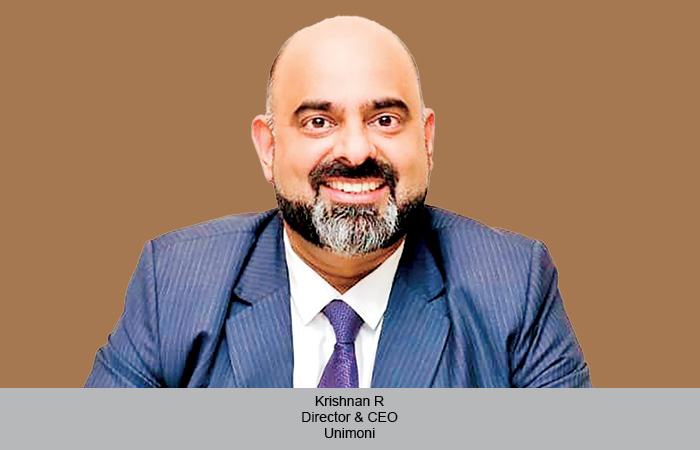Adapting technology will help companies scale their business globally through greater market footprint, optimised cost and processes with great profitability and return on investment, thereby powering this sector with exponential growth trajectory. Where are you in the technology curve?
Hazel Jain
Technology has become the backbone of our business today. And with the pandemic, many businesses globally are feeling the heat, as they realise the need to use technology as an enabler in their business as one of the key requirements. A huge proponent of this is Karthik Venkataraman, CEO & Co-Founder, Sublimis Technologies, who feels that companies should adapt technology across their business and look to remodel their platforms to enable Virtual Systems, Automation of Workflow across the Value Chain, Product Setup, Distribution, Operations, Customer Service, Improving Customer Experiences and Anywhere Work Culture with an eye for secure, device agnostic (including mobile solutions) and stable platforms, without compromising on quality and on-time service to clients.
He says, “Adapting technology not only scales their business but also helps control operating costs. All mundane jobs should be automated, and people are needed to focus on core business and exceptions.Doing this will help companies scale their business globally through greater market footprint, optimise cost and processes with great profitability and ROI, thereby powering this sector with exponential growth trajectory.” However, he cautions, it is important for technology to sync with the overall business vision. In today’s competitive environment, businesses need to be agile and smart enough to use the benefits of technology such as convenience, speed, and accuracy. Only then can it be a great time and cost saver.
Reshaping business model
Having the right technology in place is essential for travel companies to reshape their business model as the need arises. On the distribution supply side of the travel business – airlines have been traditionally constrained with 40+ years old legacy distribution technology that inhibits superior shopping and travel experience. Jerrin Jos, Founder and CEO of Verteil Technologies, feels that existing legacy-based distribution technology generally lacks innovation in offering enhanced shopping capabilities that go beyond a simple cryptic fare or rate display due to its technology limitations. “As consumer expectations increase in the retail sector to include more choices, frictionless purchasing, inspirational shopping and other personalised services, these expectations are beginning to spill over into the travel market. Against this backdrop, it is absolutely paramount for travel agencies and other travel companies to adopt technology platforms that can fulfil such expectations related to real-time updates, personalised offers, etc,”
Jos explains.
He also feels that travel companies struggle to keep pace with the constant flux in travel business due to the lack of agile technology platforms that can ensure real-time information updates, dynamic rendering of new product offerings. Verteil’s raison d’etre is to promote NDC-based direct connect distribution technology for airlines which will unlock full range of air retailing possibilities. “We are in the driver’s seat now helping airlines and travel companies adopt NDC technology to create a superior supply chain technology,” Jos claims, adding, “Without doubt, this technology transformation will enable travel companies, irrespective of their business models, to adapt to the changing times and stay relevant.”
Technology an enabler
As an Electronic Vehicle experience platform, BLive offers immersive experiences on electric bikes. It’s CEO and Co-Founder, Samarth Kholkar, says, “We wanted to introduce this in India and make it more sustainable. For us, every part of consumer experience is by leveraging technology to the maximum. Whether it is for acquiring customers online by deploying smart digital strategies or to manage our customised e-bikes through an integrated back-end system which helps track the bikes, reduce downtime and makes asset allocation more efficient. We are also set to introduce AI/VR capabilities as part of the tour, which will make the experience more engaging for our consumer. Every travel business needs to keep innovating. Technology is an enabler for the same. Our e-bikes are also smart e-bikes, which help us track their movement and also help us achieve the best range to cover more distance!” he explains.
No matter the size of the company, innovation in technology affects the growth of business, operations, customer service, employee satisfaction and brand loyalty. Harsh Mathur, Co-founder and CTO of Upswing Cognitive Hospitality Solutions, feels that the pandemic has brought remarkable innovation and changes in the way the hospitality and travel industry has been operating. “The hospitality industry (and individual operators within the ecosystem) generates vast amounts of data. Industry participants are constantly seeking technology solutions, embracing latest concepts and technologies, to help them stay ahead of competitors and consumer trends. The pandemic has called for a serious understanding of anticipatory measures for every business, irrespective of their size. Whether it is the use of contactless mobile check-in systems at the airports and hotels or harness the power of big data with AI and uncover trends that would otherwise remain hidden, the use of technology will deeply affect how both industries grow post the pandemic,” Mathur says.
Enhanced communication
However, some technology experts feel technology played a key role even before the pandemic in terms of flight bookings, hotel reservations and exploring social media for marketing and lead generation. Arun Bagaria, Co-founder, TravClan, says, “COVID-19 has brought about a change in the way things operate in every walk of life, and technology is now becoming the backbone of the tourism industry. Customers are seeking completely contactless service. This implies that right from the initial conversation to booking, payments and follow-up guidance has to be done through digital means. Customers are also looking for contactless check-in at hotels. As a result printed tickets, vouchers and passes are a thing of the past.”
Bagaria sees strong signs that in the new normal, the new contact-less communications and processes will be preferred by travellers. “However, the role of travel advisors and in-person interactions that build trust will come back once people start planning their holidays. At the same time, the level of access and communication will have to be enhanced and digital tools of communication such as WhatsApp and social media will make it happen. It has become essential for travel businesses to create and maintain a strong digital presence,” Bagaria adds.
 TravTalk India Online Magazine
TravTalk India Online Magazine





